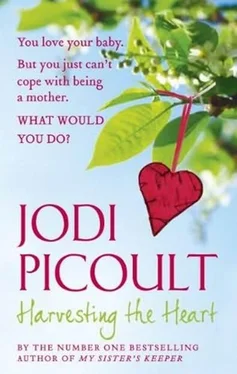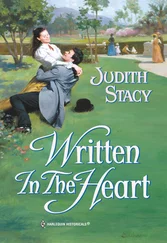I pulled on my coat without bothering to button it and headed down the street. I kept walking until I reached the heart of Cambridge. I stood under the plexiglass hood of the T station, beside a black woman with three children. She placed her hands on my stomach, the way everyone did these days. A pregnant woman, I had discovered, was public property. “You been sick?” the woman asked, and I shook my head. “Then it’s a boy.” She pulled her children out into the rain, and they walked toward Mass. Ave., jumping in puddles.
I wrapped my scarf around my head and moved into the rain again. I walked down Brattle, stopping at a tiny fenced-in play yard attached to a church. It was wet and empty, the slide still coated with last week’s snow. I turned away and kept moving down the street until the storefronts and brick buildings faded into residential clapboard mansions with spotty naked trees. I walked until I realized I was going to the graveyard.
It was a famous one, full of Revolutionary soldiers and startling tombstones. My favorite was a thin slate, jagged and broken, that announced the body of Sarah Edwards, who died of a bullet wound given by a man not her husband. The graves, placed irregularly and close together, looked like crooked teeth. Some of the markers had fallen onto their sides and were strewn with vines and brambles. Here and there a footprint was pressed into the frozen ground, making me wonder who, other than me, came to a place like this.
As a child, I had gone to graveyards with my mother. “It’s the only place I can think,” she once told me. Sometimes she went just to sit. Sometimes she went to pay her respects to near strangers. Often we went together and sat on the smooth hot stones, worn down by praying hands, and we spread between us a picnic.
My mother wrote obituaries for the Chicago Tribune. Most of the time, she sat at a phone and took down the information for the cheapest obituaries, the ones that were published in tiny black print, like classifieds: PALERMO, of Arlington, July 13, 1970. Antonietta (Rizzo), beloved wife of the late Sebastian Palermo, devoted mother of Rita Fritzski and Anthony Palermo. Funeral from the Della Rosso Funeral Home, 356 South Main St., Chicago, Monday at 9 A.M., followed by a funeral Mass celebrated in Our Lady of the Immaculate Conception Church, Chicago. Friends and relatives are respectfully invited to attend. Interment Highland Memorial Cemetery, Riverdale.
My mother took dozens of these calls every day, and she told me over and over again how she never failed to be surprised by the number of deaths in Chicago. She would come home and reel off the names of the deceased to me, which she had a knack for remembering the way some people have a thing for telephone numbers. She never went to the cemetery to see these people-the “classifieds”-at least not intentionally. But from time to time her editor let her write one of the real obituaries, the ones for semifamous people, set in skinny columns like news articles. HERBERT R. QUASHNER, the headline would read. WAS ARMY LAB FOREMAN. My mother liked doing those best. “You get to tell a story,” she’d say. “This guy used to be a member of the Destroyer Escort Sailors Association. He was in World War II, on a submarine chaser. He belonged to the Elks.”
My mother wrote these obituaries at home, sitting at the kitchen table. She used to complain about deadlines, which she said was pretty funny, given her business. When the articles were printed, she clipped them neatly and stored them in a photo album. I used to wonder what would happen to that album if we all died in a fire; whether the police would think my mother had been a sick serial killer. But my mother insisted on keeping a record of her work, which she left behind, anyway, the day she disappeared.
My mother would make a weekly list of the important names she wrote about. Then on Saturday, her day off, we’d go to the closest cemeteries, looking for the freshly turned earthssiÑturned ea that marked the newest interments. My mother would kneel in front of the graves of these people she hardly knew, still without headstones. She would sift the fine brown dirt through her fingers like a sieve. “Paige,” she’d say, throwing back her shoulders, “take a deep breath. What can you smell?”
I would look around and see the lilac bushes and the forsythia, but I wouldn’t take a deep breath. There was something about being in the cemetery that made me monitor my breathing, as if without warning I might find that I’d run out of air.
Once, my mother and I sat under the red shade of a Japanese maple, having visited the former Mary T. French, a public librarian. We had eaten barbecued chicken and potato salad and had wiped our fingers on our skirts, devil-may-care. Then my mother had stretched out across an old grassy grave, resting her head on a flat marker. She patted her thighs, encouraging me to lie down as well.
“You’re going to crush him,” I said, very serious, and my mother obligingly moved to the side. I sat down beside her and put my head in her lap and let the sun wash over my closed eyes and my smile. My mother’s skirt blew about, whipping the edge of my neck. “Mommy,” I said, “where do you go when you’re dead?”
My mother took a deep breath, one that made her body puff like a cushion. “I don’t know, Paige,” she said. “Where do you think you go?”
I ran my hand over the cool grass to my right. “Maybe they’re all underground, looking up at us.”
“Maybe they’re in heaven, looking down,” my mother said.
I opened my eyes and stared at the sun until bursts of color exploded, orange and yellow and red, like fireworks. “What’s heaven like?” I said.
My mother had rolled to her side, sliding me off her lap. “After sticking out life,” she had said, “I hope it’s whatever you want it to be.”
It struck me as I moved through this Cambridge graveyard that my own mother could be in heaven now. If there was a heaven; if she had died. I wondered if she was buried in a state where it never snowed, if she was in a different country. I wondered who came to lay lilies at her grave and who had commissioned the inscription. I wondered if her obituary would mention that she was the devoted mother of Paige O’Toole.
I used to ask my father why my mother left, and he told me over and over the same thing: “Because she wanted to.” As the years went by he said it with less bitterness, but that didn’t make the words any easier to believe. The mother I imagined over the years, the one with the shy smile and the full skirts, who had the power to heal scrapes and bruises with a kiss and who could tell bedtime stories like Scheherazade, would not have left. I liked to think my mother was pulled away by forces greater than herself. Maybe it was some international intrigue she was involved in, and the final chapter meant trading her own identity to protect her family. For a time I wondered if she was half of a pair of fated lovers, and I almost forgave her running from my father if it meant being with the man who held her heart. Maybe she was just restless. Maybe she was looking for someons CÑg for some she had lost.
I ran my hands over the smooth graves, trying to picture the face of my mother. Finally, I came to a flat marker, and I lay down with my head upon it, crossing my hands over the life in my belly, staring at the ice in the sky. I stretched out on the frozen ground until it seeped into my bones: the rain, the cold, these ghosts.

More than anything else in the world, my mother had hated opening the refrigerator and finding the juice pitcher empty. It was always my father’s fault; I was too little to pour for myself. It wasn’t as though my father did it on purpose. His mind was usually on other things, and since it wasn’t a priority, he never checked to see how low the lemonade was when he stuck it back inside the Frigidaire. Three times a week, at least, I would find my mother standing in the slice of cold air from the open refrigerator, waving the blue juice pitcher. “What is so damned difficult about mixing a can of frozen Minute Maid?” she would yell. She’d stare at me. “What am I supposed to do with a half inch of juice?”
Читать дальше













